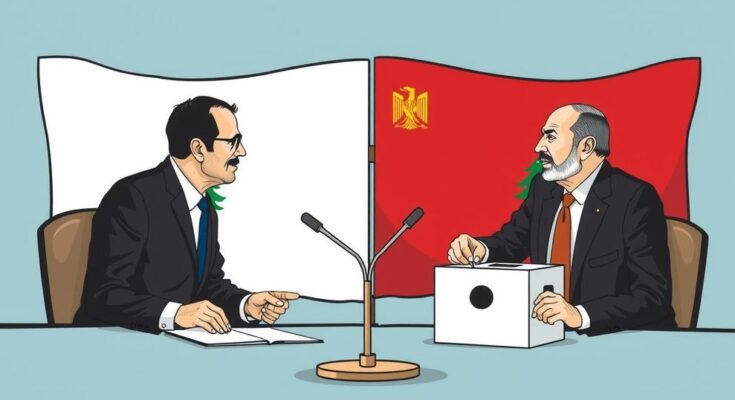Egypt’s Foreign Minister Badr Abdelatty spoke with Lebanese Foreign Minister Abdullah Bou Habib regarding Lebanon’s upcoming presidential election scheduled for January 9, 2025. They discussed the importance of achieving a national consensus free from foreign influence and addressed the political situation in Syria. Lebanon has been without a president since October 2022, following the end of Michel Aoun’s term, amid ongoing socio-political challenges.
On January 5, 2025, Egyptian Foreign Minister Badr Abdelatty engaged in a telephone conversation with his Lebanese counterpart, Abdullah Bou Habib, to discuss the current political situation in Lebanon, particularly ahead of an imminent parliamentary session scheduled for January 9 to elect a new president. Abdelatty emphasized the urgency of building a Lebanese national consensus to swiftly resolve the ongoing presidential void without any external influence. The discussion also encompassed the political and security landscape in Syria, stressing the importance of supporting Syrian sovereignty and ensuring that the political transition reflects the genuine aspirations of the Syrian populace, free from foreign intervention. Following a ceasefire agreement between Israel and Lebanon, which concluded an extended period of hostilities, the political climate in Lebanon is of heightened interest, particularly owing to the tremendous loss of life and displacement of civilians due to recent military actions. Since President Michel Aoun’s term ended in October 2022, Lebanon has been operating without a president, highlighting the necessity for a path forward aligned with the National Pact of Lebanon’s political framework.
The election of a new president in Lebanon is a significant political event due to the existing political void since October 2022. Lebanon’s National Pact stipulates a specific sectarian distribution of power, which designates the president and army commander as Maronite Christians, the prime minister as a Sunni Muslim, and the parliament speaker as a Shia Muslim. This intricate power-sharing requires careful negotiation and consensus among various political factions. Furthermore, the Lebanese political landscape is currently shaped by tensions resulting from recent conflicts, including the deteriorating situation in Syria and the repercussions of military confrontations with Israel, which have led to loss of life and displacement in Lebanon. The need for a united national stance that disregards external interference is paramount for Lebanese stability.
In summary, the recent dialogue between Egypt and Lebanon underscores the critical need for an inclusive national consensus in Lebanon as the parliament prepares to elect a new president on January 9. The emphasis on maintaining Syrian sovereignty while navigating the strained political relations in Lebanon and the broader region reflects the complexities that underpin contemporary Middle Eastern politics. The outcome of the Lebanese presidential election will be pivotal in addressing internal challenges and ensuring national unity amidst external pressures.
Original Source: www.egypttoday.com




